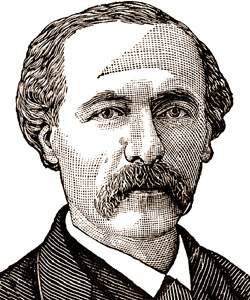James Redpath (American National Biography)
Scholarship
After being educated in his father's academy, Redpath emigrated with his family to the United States in 1849 and soon found work as a reporter for Horace Greeley's New York Tribune. In the mid-1850s he made three journeys through the South, secretly interviewing slaves and publishing their accounts of slavery in abolitionist newspapers and in The Roving Editor: or, Talks with the Slaves (1859). He reported finding many discontented slaves prepared to revolt if aided by the abolitionists.
In 1855 Redpath moved to Kansas Territory, where he reported on events for the St. Louis Missouri Democrat, the Chicago Tribune, the New York Tribune, and other northern papers. In 1857 he briefly edited his own newspaper, the Doniphan (Kans.) Crusader of Freedom. During these years, Redpath became a close associate of John Brown in the campaign to make Kansas Territory a free state. In 1858 Brown encouraged Redpath to move to Boston to help rally support for Brown's plan to incite a southern slave insurrection. After the failure of Brown's attack at Harpers Ferry, Virginia, Redpath participated in unsuccessful efforts to rescue captured raiders. Soon after, Redpath wrote the first biography of the executed abolitionist, The Public Life of Capt. John Brown (1860). This work was uncompromisingly sympathetic toward its subject and helped secure for Brown a lasting reputation as a martyr for freedom.
In 1855 Redpath moved to Kansas Territory, where he reported on events for the St. Louis Missouri Democrat, the Chicago Tribune, the New York Tribune, and other northern papers. In 1857 he briefly edited his own newspaper, the Doniphan (Kans.) Crusader of Freedom. During these years, Redpath became a close associate of John Brown in the campaign to make Kansas Territory a free state. In 1858 Brown encouraged Redpath to move to Boston to help rally support for Brown's plan to incite a southern slave insurrection. After the failure of Brown's attack at Harpers Ferry, Virginia, Redpath participated in unsuccessful efforts to rescue captured raiders. Soon after, Redpath wrote the first biography of the executed abolitionist, The Public Life of Capt. John Brown (1860). This work was uncompromisingly sympathetic toward its subject and helped secure for Brown a lasting reputation as a martyr for freedom.
John R. McKivigan, "Redpath, James," American National Biography Online, February 2000, http://www.anb.org/articles/16/16-01354.html.



